If you think of Mad Men and Don Draper when you hear “marketing,” you’re really only thinking of one aspect of marketing: copywriting.
The truth is, marketing is an umbrella term that describes a whole lot of career paths. Not all marketers are copywriters. In fact, many marketers’ jobs don’t involve any writing at all!
With the rise of technologies like internet search engines, smartphones, and social media platforms, most of today’s marketing is a far cry from the newsprint and billboard ads of Don Draper’s day.
Marketing strategies and best practices are constantly changing in response to factors like advances in technology, new insights from data analysis, and changes to Google’s algorithms. If all that sounds complicated, don’t be alarmed! – there are plenty of resources available to help you make sense of it all and help you become an expert, no matter which marketing career path you choose.
The awesome thing about marketing is you don’t need a college degree to do it – the people who hire you will care far more about your results than what qualifications you do or don’t have. Moreover, marketing is an excellent career path that can lead to a wide variety of career advancement opportunities – consider the fact that 20 percent of Fortune 500 CEOs started their careers in sales and marketing, according to Forbes.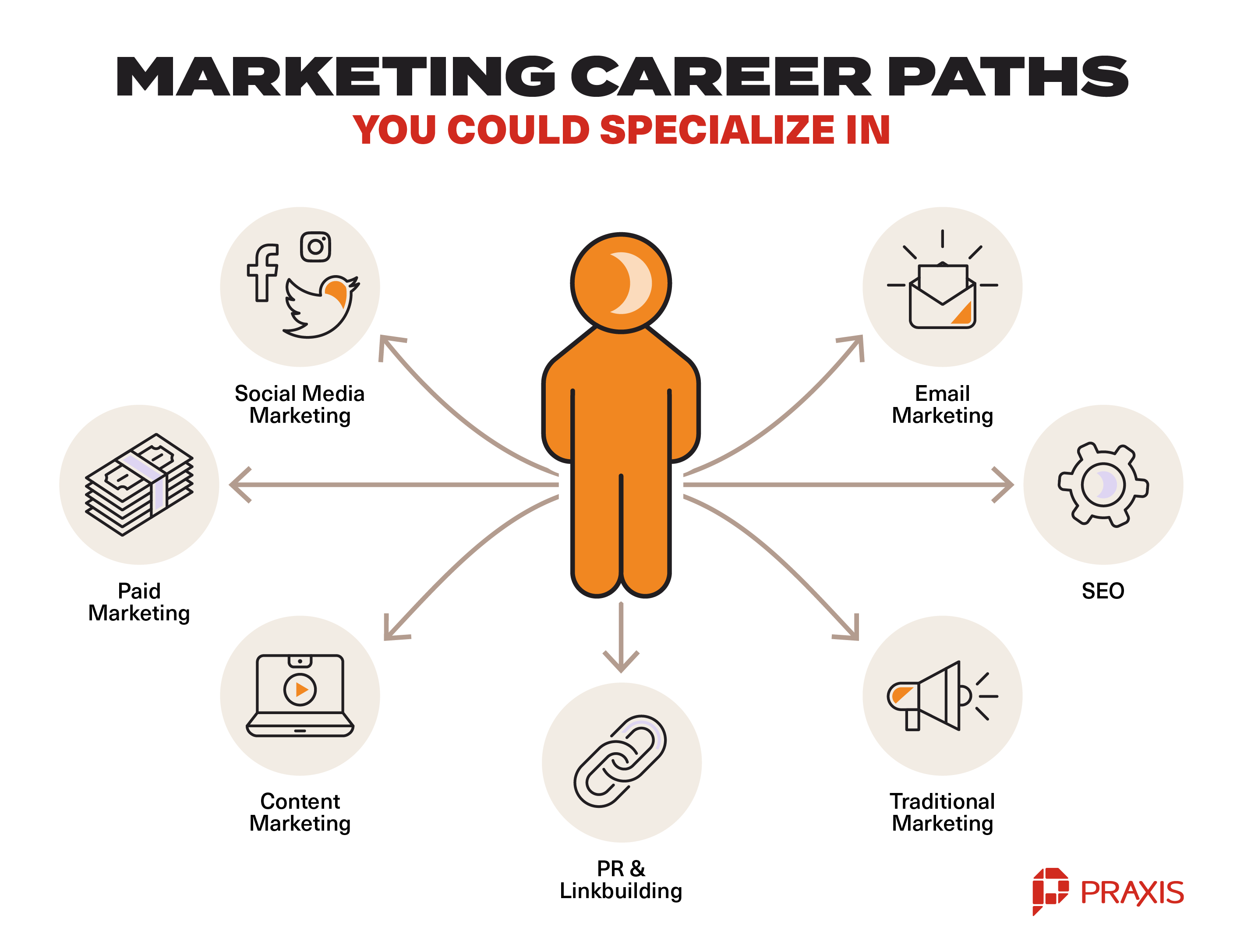
Marketing Specializations to Consider
Marketing roles come in all shapes and sizes. Like most careers, the more specialized your expertise is, the better you’ll be at your job – and the more you can charge to do it.
Let’s take a look at some of the marketing career paths you can choose from:
Social Media Marketing
Social media marketing is another umbrella term that includes a plethora of different possibilities. Facebook, Instagram, Twitter, LinkedIn, TikTok, Snap, Reddit, Quora, Pinterest, and more – each channel has its own possibilities and requires different skills and strategies.
Paid/Pay-Per-Click (PPC) Advertising
Paid advertising or PPC marketing refers to online advertising models that cost marketers money for every person that clicks on the ad. PPC marketers use a variety of strategies to make sure their adverts reach their intended audience, including bidding on specific keywords, localizing adverts to specific geographic locations, or using specific demographic data to determine who their ads are shown to. Typically, the more specific your parameters are, the higher your cost-per-click will be.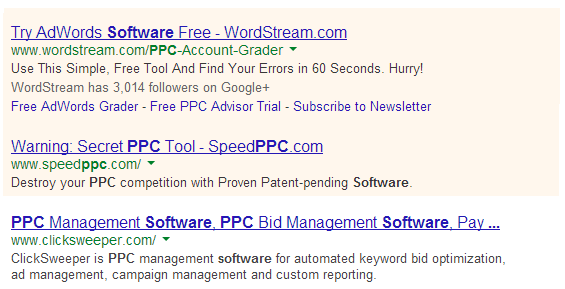
Content Marketing
Also known as “inbound marketing,” content marketing is a broad type of marketing that involves creating online materials (blog posts, videos, social media posts) that aren’t really focused on marketing or selling a product. While they may mention or link to the product, their first purpose is to offer the reader or viewer value by helping them identify and address their needs.
Inbound marketing is all about generating organic traffic to your (or your client’s) website and convincing visitors that your product or service is the answer to their problem. A common approach involves targeting search engine users at various stages of the sales funnel (their product awareness journey) to turn visitors from casual browsers into leads and customers.
Search Engine Optimization (SEO)
If you’ve started looking into marketing careers already, you’ve probably come across the term “search engine optimization” or “SEO.” In a nutshell, SEO refers to the strategies and tactics marketers use to get websites to rank higher in search engine results. SEO specialists make it their mission to understand how search engines like Google rank content in their search engine results pages (SERPs). The trouble is, search engines like to tweak their algorithms every so often, to make sure that users find the content that’s truly relevant to their search queries, so the rules keep changing.
The good news for marketers is that a lot of business owners think SEO is basically black magic: they don’t know (or want to know) how to do it themselves, but they know that they need it if they want their website to rank. Translation: they’re willing to pay princely sums to specialists who can do it for them.
PR and Linkbuilding
Public relations and linkbuilding is another key digital marketing strategy that can do wonders for a brand’s visibility and sales metrics (not to mention SERP ranking). PR and linkbuilding are all about getting other publications and websites to talk about (and link to) your product or service.
Sometimes this happens organically when your content is just so good that other people link to it because it’s such a good resource, but often a lot of effort (and networking) goes into getting websites and publishers to mention your brand or let you create guest posts.
Traditional Marketing
Traditional marketing includes areas like print ads in magazines and newspapers, billboards, television and radio adverts, letters, other print materials, and telephone calls.
Traditional marketing is not dead – much of it has simply moved online. For instance, a lot of audio advertisements that formerly would have broadcast on the radio are now hosted on podcasts, audiobooks, and music streaming platforms. Similarly, video ads that might formerly have been TV spots are now used to target YouTube audiences.
Copywriting
Truth be told, copywriting plays into every aspect of marketing to some extent, but we’ve listed it separately here to draw attention to the distinction between copywriting and content writing. While both involve writing for marketing purposes, content writing aims to drive traffic and boat general brand or product awareness, whereas copywriting aims to convert leads into sales. As such, copywriting is slightly more sales-y and persuasive and tends to be more steeped in brand identity. Not every content writer is a copywriter and vice versa, but it’s very useful to have both skills in your arsenal. For more on copywriting, check out QuickSprout’s Complete Guide to Copywriting
Email Marketing
Email marketing is exactly what it sounds like. You may be thinking “writing emails is easy, anyone can do that!” and you wouldn’t be wrong, but it’s a bit more complex than that. First, you need to master the art of writing subject lines that make people want to read your emails. Then you need to make sure that your emails live up to the promises made by your subject lines. If your emails don’t provide value to readers, they’ll quickly stop opening your emails, or worse, unsubscribe or block you.
Moreover, most email providers have aggressive spam filters that will automatically relegate your carefully crafted email to the spam bin, never to be seen again, if you don’t follow ever-changing email marketing best practices.
If you want to learn from a consummate pro, check out email marketing guru Val Geisler’s email marketing incubator.
Skills Needed for Marketing
Success in marketing comes down to a combination of soft skills and hard skills. On the one hand, you need the technical industry knowledge of how marketing works and how to use marketing software and best practice tactics to make your strategy work as well as execution skills like copywriting, graphic design, or technical SEO – or whatever your role is. On the other hand, having all these skills won’t get you very far if you don’t have the soft skills to deal with clients or employers and effectively collaborate with coworkers.
Let’s take a look at some of the soft skills and hard skills that come in handy in a career in marketing:
Useful Soft Skills for Marketing
Did you know that some 85% of job success comes down to well-developed soft skills? This is according to research by Harvard, the Carnegie Foundation, and the Stanford Research Center.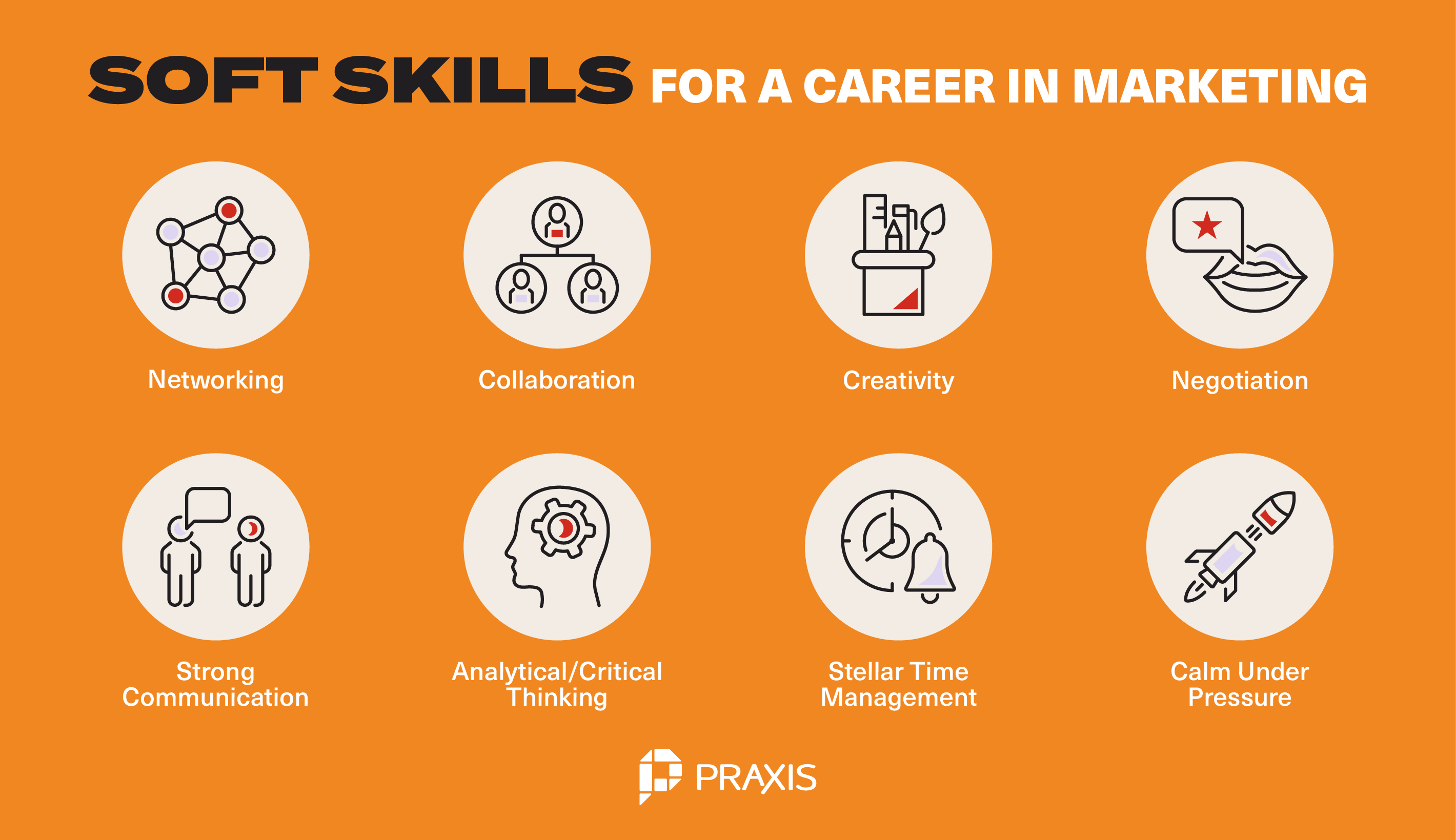
Strong Communication Skills
Being able to communicate effectively is a crucial skill in marketing. Not only do you need to be able to bring your point across in a way that’s clearly understood, but you also need to be a perceptive listener (or reader) to understand your target audience’s real needs and sell your product in a way that addresses those needs.
Analytical/Critical Thinking Capabilities
Marketing is really about problem-solving: How can your product or service make your audience member’s life easier? Analytical thinking skills will also serve you well when interpreting data pertaining to past marketing activities and creating future marketing strategies.
Creativity
At its core, marketing is a creative industry. Whether you’re a high-level strategist, a content writer, or a graphic designer, creativity is what separates your marketing initiatives from the rest and makes them stand out and appeal to your audience.
Negotiation Skills
Being able to negotiate is a skill that will serve you well regardless of your career path, and marketing is no exception. Whether it’s nailing down the terms of a contract with a client, convincing your boss that you deserve a raise, or simply writing super persuasive copy, being good at negotiating is one of the skills that will offer you the most advantages.
Calm Under Pressure
Marketing can be a high-pressure job with short deadlines, high stakes, and shifting goalposts. How well you keep your cool when the going gets difficult will be a determining factor in whether or not marketing is a good career fit for you.
Stellar Time Management
Self-mastery and the ability to manage your time effectively is one of the most important skills you can learn. Time management and self-discipline become even more critical for entrepreneurs and freelance marketing professionals who are not bound by traditional office hours.
Collaboration Skills
In today’s complex marketing landscape, it’s quite rare for one person to do everything involved in marketing a product or service. As such, it’s vital that you’re capable of working together with other people in a way that gets results.
Networking Capabilities
Being able to network and make lasting business connections is an invaluable skill in any marketers arsenal, but never more so than for linkbuilders and public relations professionals. PR is all about building and nurturing relationships, so if you’re a “people person,” this might be a good career path for you.
Useful Hard Skills for Marketing
Each marketing role looks different and requires different skills. As such, don’t feel that you need all the skills listed below – this is simply a roundup of skills that may come in handy in the course of your marketing career.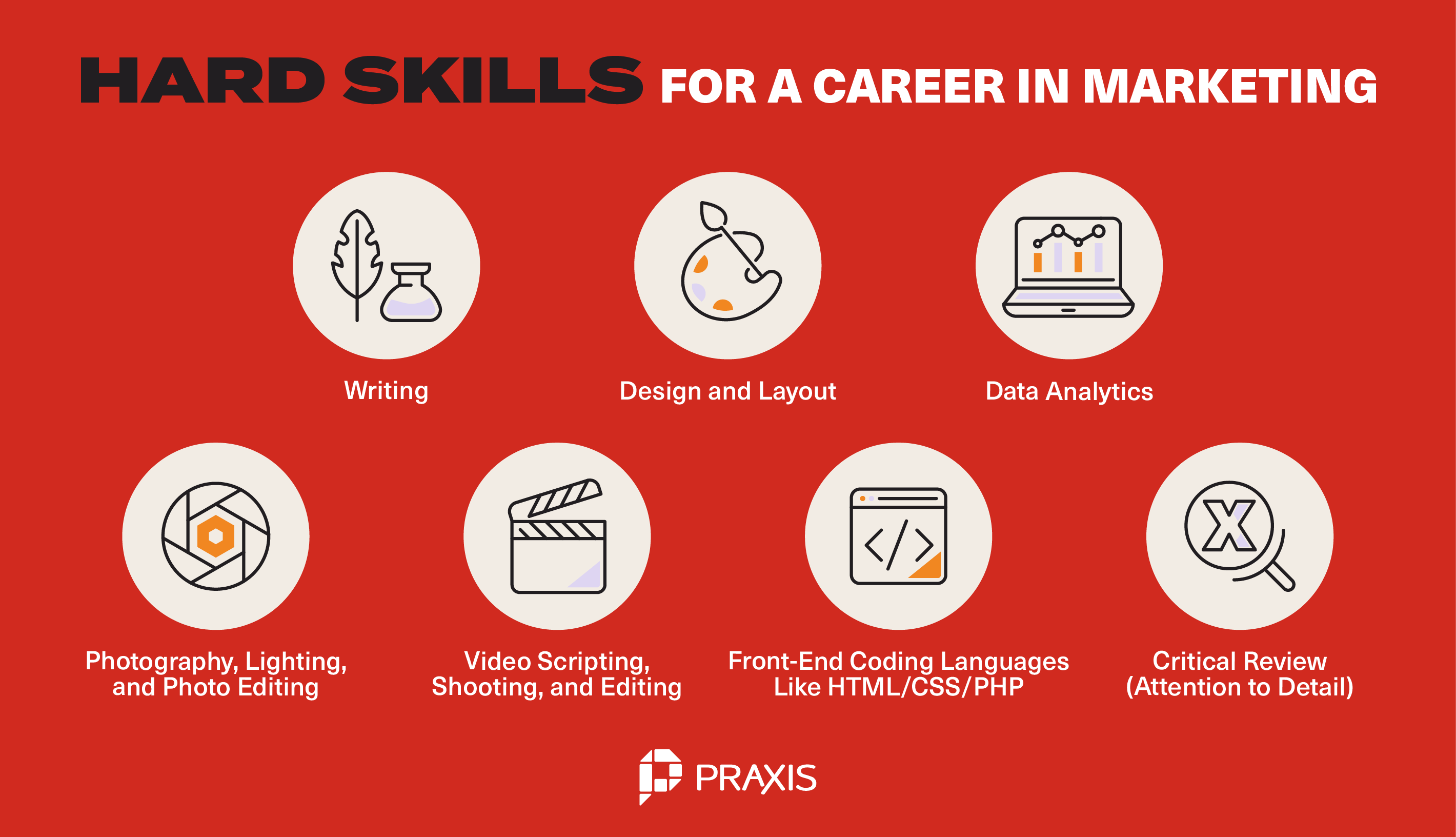
Tech and Software Capabilities Useful for Marketing
Whichever marketing niche you end up pursuing, it’s best that you know the tools of your trade. Here are a few of the technologies and software tools that it’s worth familiarizing yourself with: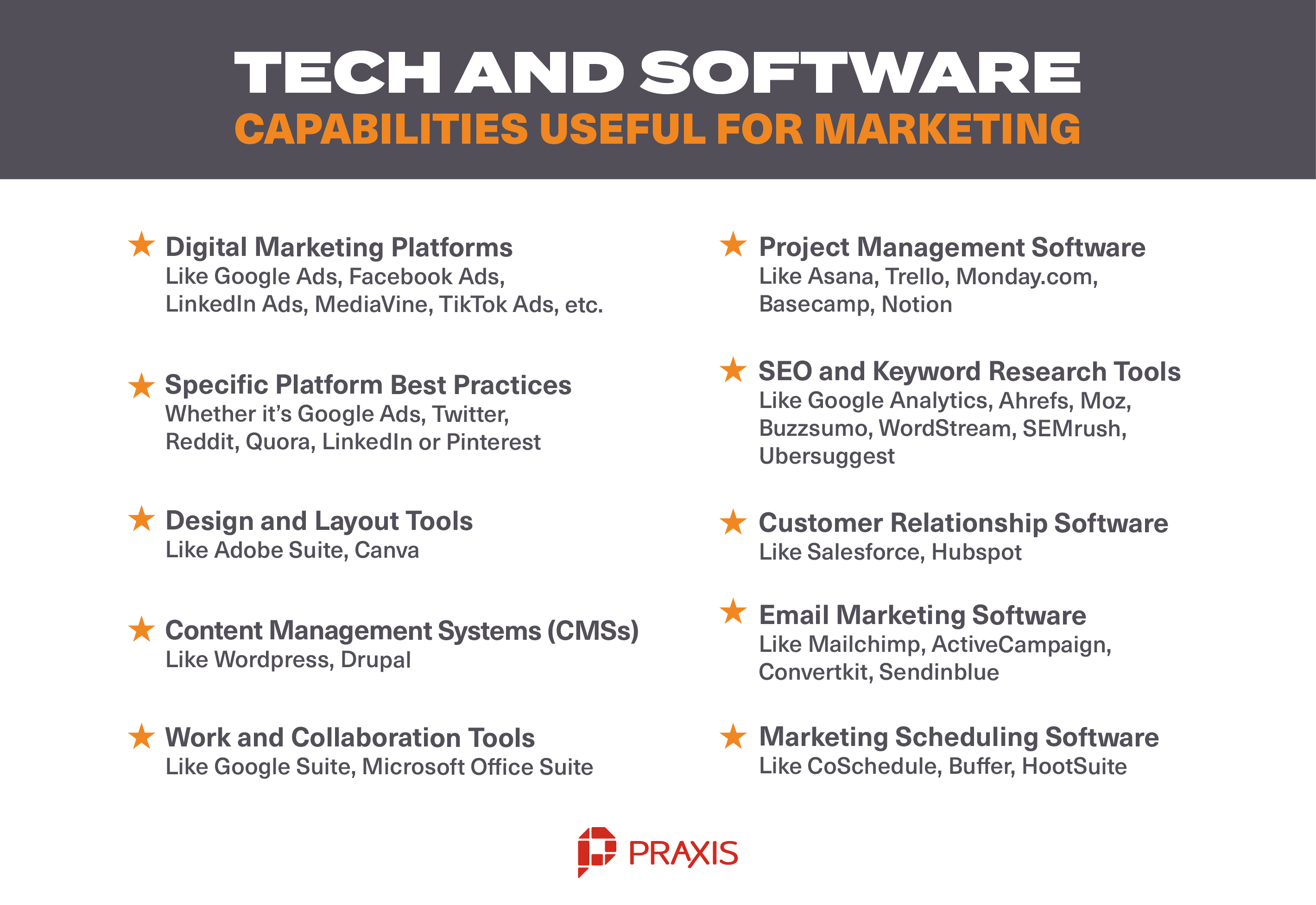
The Marketing Career Path: From Entry-Level to Chief Marketing Officer
No two marketing career paths look the same, and there are countless ways to become a skilled, in-demand, and well-paid marketing professional. Let’s look at a few of the career paths you could take to become a marketing guru – without setting foot in college.
Keep in mind that these are just hypothetical overviews and that everyone’s path looks different.
Marketing Career Path One: The Freelance Marketer
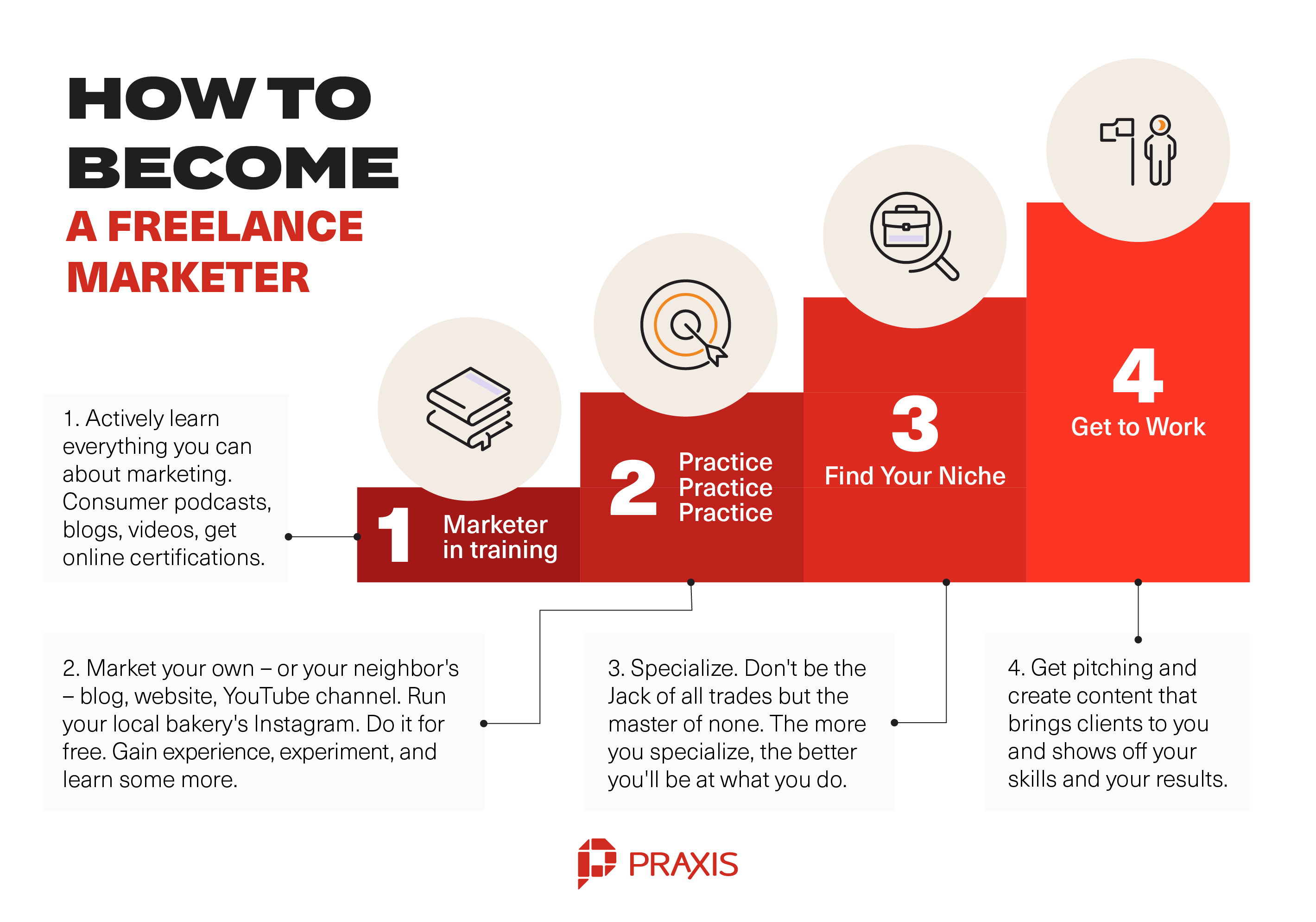
Step 1 | Marketer-in-Training
Spoiler alert: you never really leave this step. But before you get started, you need to learn enough about your chosen marketing niche to know what you’re doing. Watch YouTube Videos. Listen to marketing podcasts. Read blogs about marketing. Find a mentor. Do online courses. Or enroll in Praxis. Most of all, practice. Having theoretical knowledge of how to do keyword research is very different from actually doing it.
Step 2 | Practice, Experiment and Build Your Skills
Now that you know a bit more about marketing, it’s time to hone your skills. You can do this by marketing your own services (or products), or by approaching friends, family, and other people in your network and offering them your services. This is good sales practice, by the way. You’ll need that ability later if you continue down the freelancing path.
Offering to work for free initially is a good way to get clients and build up your portfolio while you learn the ropes. With hard work, continued learning, and a bit of luck, you should be able to show your results soon enough. Experimenting with different approaches and strategies will help you identify what kind of marketer you want to be, allowing you to zoom in on a particular specialization, like inbound content, technical SEO, or Facebook Ads.
Step 3 | Find Your Niche
In the beginning, it’ll feel overwhelming. You’ll feel that you need to learn everything to be a good marketer. The truth is, while it doesn’t hurt to have a good working knowledge of how all the moving parts work, specializing in a specific skill set fairly soon is your best bet if you want to become the kind of consultant people pay big bucks for. Starting out as a generalist is fine, but it’s really hard to be good at everything, so eventually, you’ll need to narrow your focus.
Step 4 | Advertise, Pitch, and Get to Work
Once you’re confident in your abilities as a marketer, it’s time to start playing in the big leagues. Start advertising your services using the skills you’ve learned. Set up a website where you can house case studies showcasing your past work and results. It doesn’t have to be fancy – you can always upgrade it later. For now, you just want a space where people can find you and see that you know what you’re doing. Your first website is almost never your final website, so keep it simple and don’t overinvest in getting it perfect. As you gain a reputation in your marketing niche, you may find that you become a brand. That’s a good thing – embrace and nurture it. People like to do business with people, not companies. Read more about building your personal brand here.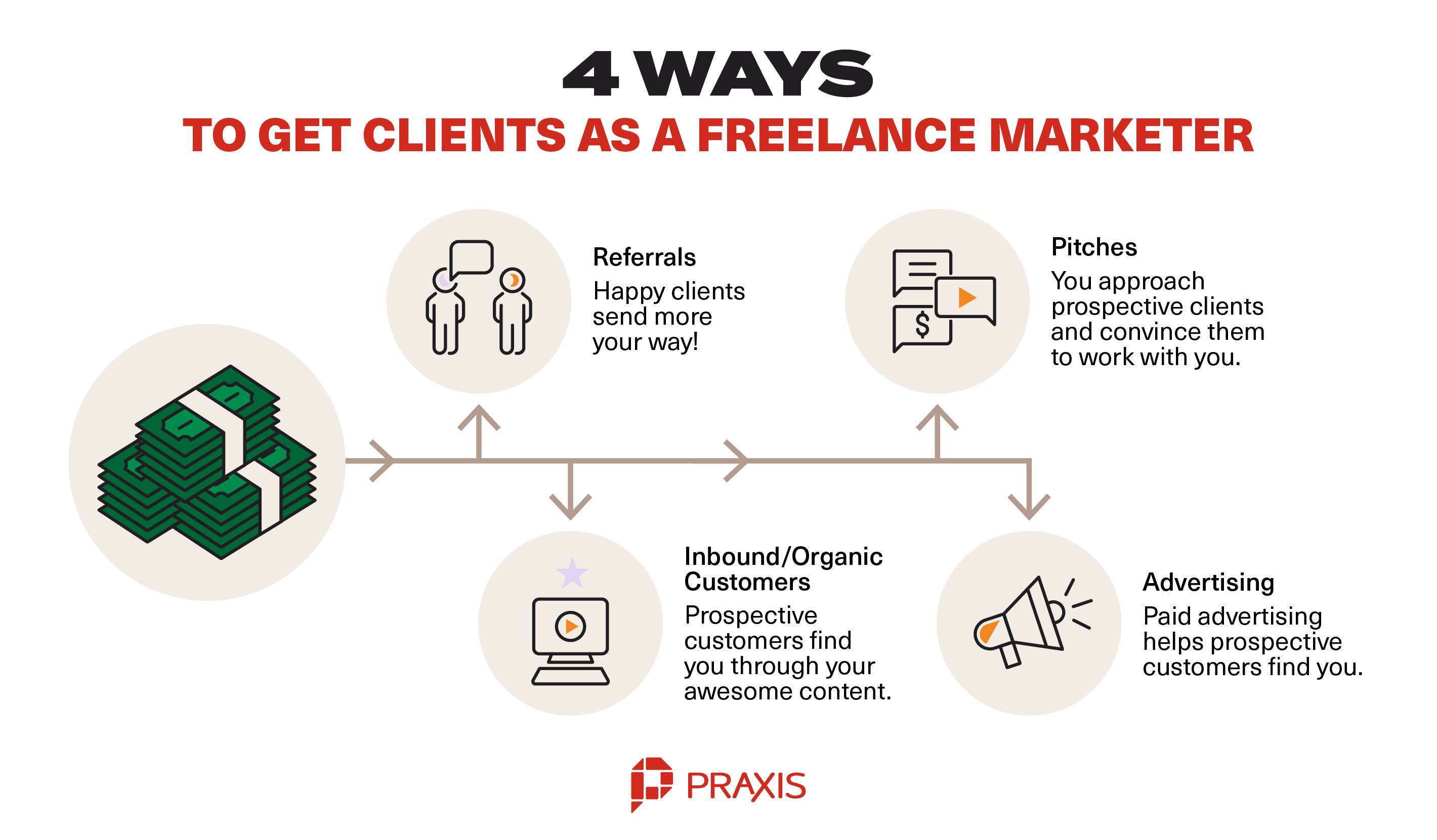
Marketing Career Path Two: Climb the Corporate Ladder
For this kind of marketing job, you probably think you’d need some prior marketing experience or even a degree in marketing or communications. While that might still hold true for some marketing agencies, the truth is, the majority of agencies will care more about the value you create than whether or not you’re “qualified.” You also don’t need to work for a traditional agency to be a marketer anymore. In fact, 89 percent of marketers polled by Databox said that a degree is not needed to become a marketer.
Focus on getting some marketing experience. Luckily, that doesn’t have to mean you worked for an agency for two years – it could mean you’ve been successfully marketing your own blog, or your cousin’s podcast, or your neighbor’s pet grooming business.
It’s also a good idea to do a formal certification in something like Google Analytics or Google Paid. Courses and certifications tell prospective employers that you’re familiar with the platform, made the effort to study the subject, that you’re a proactive self-starter.
The corporate marketing ladder will look different from company to company as each organization will likely have its own job roles based on its priorities, but most corporate marketing career paths will look something like this:
Step 1 | Intern/entry-level job
Step 2 | Junior content or marketing role
Step 3 | Mid-level marketing role
Step 4 | Senior marketing role
Step 5 | C-Suite marketing executive role
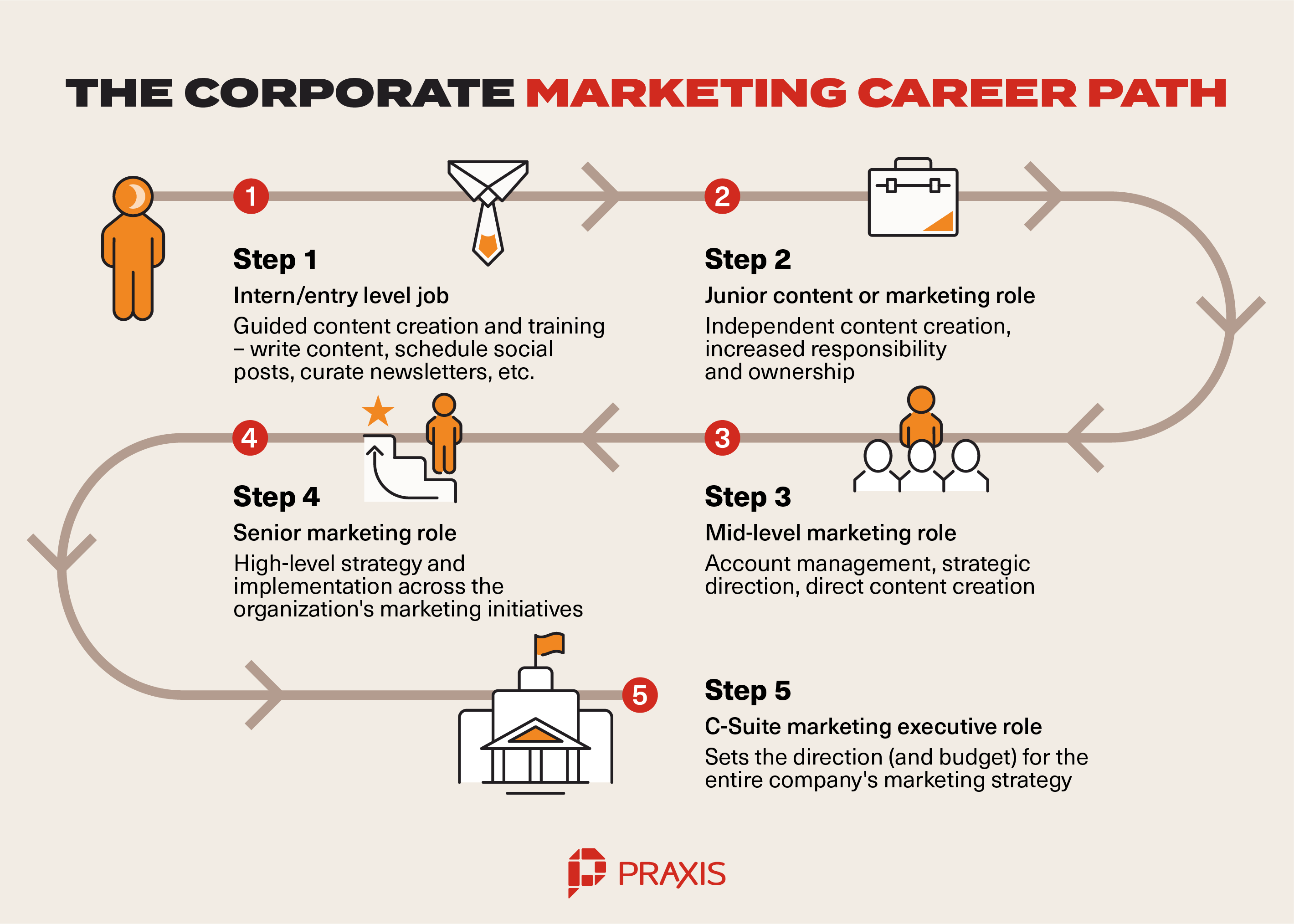
Marketing Career Path Three: Praxis
We understand all of this is a lot to take in. Confronted with all this information, the road to becoming a marketer may seem long and winding. But it doesn’t have to be.
Praxis is a college alternative that leads to a full-time job. Our program is designed to help you get ahead of the curve by gaining practical experience in in-demand skills – like marketing.
If you enroll in Praxis, you’ll surround yourself with passionate, driven people like yourself who’ve made the decision to take their education – and their careers – into their own hands.
With the help of experienced mentors and coaches, you’ll learn the fundamentals of sales and marketing as well as a variety of other useful skills to prepare you for the world of marketing – if you choose that as your career path. Personal projects will allow you to learn by doing, fast-tracking your skills development so you can really hit the ground running. You’ll also have the freedom to experiment and explore other career options if you feel that marketing isn’t a good fit for your personality and strengths.
Through Praxis, you’ll build the foundational skills you need to take your first steps down either of the two marketing career paths outlined above, whether you choose to climb the corporate ladder or take on the challenge of being a freelance marketing entrepreneur.
Here’s what your marketing career path looks like with Praxis: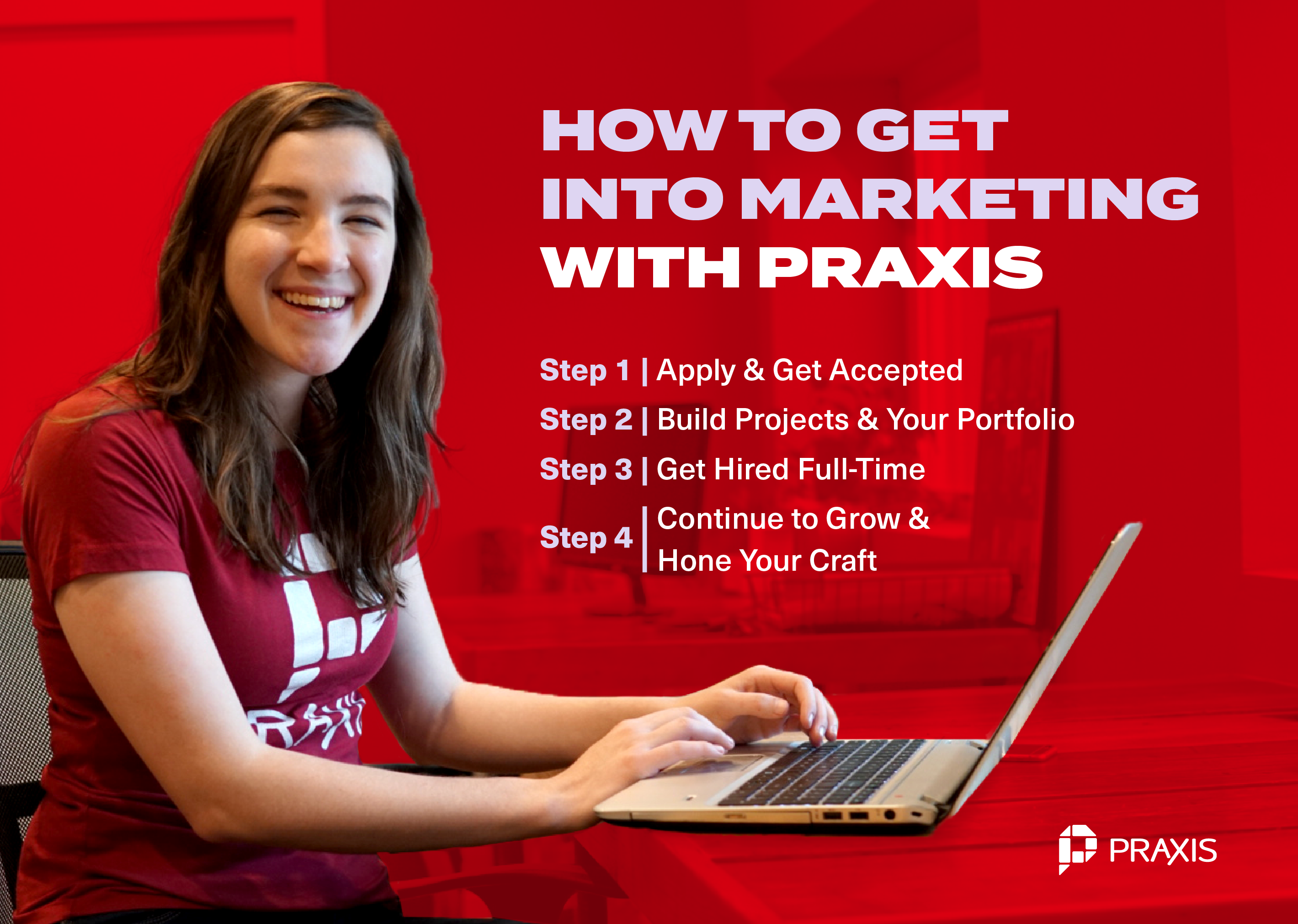
Step 1 | Apply for Praxis and Get Accepted
Simply hit “apply now” at the bottom of this page and follow the prompts. If you’re accepted, that’s where the real fun and hard work begins.
Step 2 | Build Projects & Your Portfolio
During your time at Praxis, you’ll have the opportunity to create your own projects, test what works and what doesn’t, and build a portfolio of work that showcases your skills to future employers and clients.
As part of the bootcamp portion of our program, you’ll do a Personal Development Project (PDP) which is a 30-day challenge designed to help our participants achieve four basic goals:
- The skill development and self-mastery that you achieve by performing challenging tasks out of commitment rather than convenience.
- The feeling of self-confidence and accomplishment that stems from consistently meeting the goals you set yourself.
- The sense of self-worth and actualization you gain from repeatedly investing in constructive or creative action.
- The practical, real-world results of consistently prioritizing action and finishing things.
A PDP is basically something you commit to doing for a month in order to become a better version of yourself and to achieve clear, tangible outcomes.
This is an incredibly valuable exercise when preparing for your first marketing role.
As an example, say you’re looking to write blogs and social media copy for a technology startup. You could develop a PDP where you practice writing headlines and test and blog about the results, as this copywriter did.
Or, if you’re more interested in data analytics, you could set up a website with a fully functional google tag manager setup by following an online tutorial and creating a checklist that you can implement to help other sites improve their data collection.
Check out our full post on building a PDP for more ideas and a template to help you develop your own project.
Step 3 | Get Hired Full-Time
During the 6-month bootcamp portion of our program, you’ll discover early career interests and opportunities, develop in-demand professional skills, and build your portfolio through projects and individualized learning plans. During this time, we’ll also help you identify a full-time job placement at a growing company that resonates with you and complements the skills you’ve been developing.
We help you get off to a strong start in your new job and set you up for long-term success through weekly workshops, professional development projects, and office hour sessions with professional advisors.
Step 4 | Continue to Grow and Hone Your Craft
Just as you can’t learn to ride a bike by reading bike riding books about it, you can’t expect to learn how to be a marketer by reading marketing books. The more practice you get, the sooner you’ll get good at it.
Once you’ve gotten a good sense of the different marketing skills you could choose from to master and tried your hand at a few, you can focus on honing a specialized skill or marketing role.
We’ve outlined four examples below, but keep in mind that there are many other options:
One: Data Analytics
Data analytics is an excellent field to learn because metrics and reporting are at the foundation of any successful marketing team. Here is a list of helpful tutorials and checklists that you can use to supplement your PDP and data analytics practice:
- How to use Google Analytics like you know what you’re doing (with a helpful Google Analytics scorecard)
- Annie Cushing’s analytics audit spreadsheet (and a blog post to make it more decipherable )
- Google Tag Manager tutorial from Measure School
Two: Copywriting and Content Marketing
Writing is a constantly undervalued hard skill that’s one of the fastest ways to set yourself apart as a marketer. At Praxis, we have an entire month of the program entirely dedicated to publishing a blog post everyday.
It’s hard enough to find folks who can write and communicate well in general, let alone finding someone who can help persuade potential buyers and users to take action.
Here are some of my favorite resources a mix of classic texts with some contemporary masters. If you decide to work on your writing craft, they will help you sharpen your skills.
- The Boron Letters
- Ogilvy on Advertising
- The Ad Contrarian
- Copy Hackers
- Neville Medhora’s Copywriting Blog
Three: Video
Over the last few years, video has exploded in the marketing world and now it’s an essential part of most successful marketing campaigns. There is an enormous opportunity to create value with this skillset because there are still many technical bottlenecks to producing memorable videos.
Whether you pick up editing skills, learn to master lighting, or can put the whole process together from building out a script to publishing the video to social media, diving into this aspect of marketing can help you score experience working with high-growth marketing teams.
Here are our tips for getting started with video, even if you’ve only played around with your phone:
- Check out Paolo from Growth Tribe and his series on mastering video for marketers
- Another great video from Growth Tribe on video this time with Denis Yu
- Download and review the use cases of Loom for marketing. Start using it!
Four: Design, User Experience, and User Onboarding
Out of the four foundational skills we’ve covered, this is the most difficult one to quantify objectively. It’s hard to break great design down into objective steps and elements. There’s something about a really good piece of design that pops and works on a subjective level.
The best way to start developing the tacit knowledge and skill that every experienced designer has is to start shipping design projects as soon – and frequently – as possible.
However, here are some of our favorite guides and resources that will help you grow immensely if you read them in tandem with your practice:
- Hack Design
- Canva tips and tricks by Lolita Allgyer
- The user onboarding collection of design teardowns
- The UX Booth guide to information architecture
Get Started with Praxis
Sound good? What are you waiting for? Hit that “Apply” button below to get started down your marketing career path.
June 15, 2023
